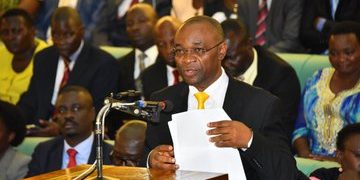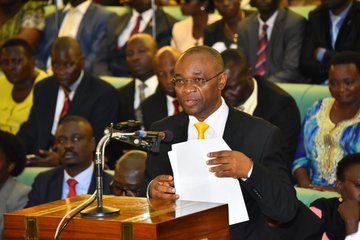The Minister for Local Government, Hon. Raphael Magyezi has asked lawmakers to amend the Public Finance Management Act to mandate local governments to appropriate local revenues in accordance with the Constitution, the Local Government Act and the policy on decentralization.
Article 191 (1) of the constitution states that local governments shall have power to levy, charge, collect and appropriate fees and taxes in accordance with any law enacted by Parliament by virtue of Article 152 of this Constitution.
Subsection 3 of the article states that, ‘no appropriation of funds by a local government shall be made unless approved in a budget by its council’.
Magyezi said that the Public Management Act’s provision which mandates Parliament to appropriate revenue collected by local governments through the central government is inconsistent with the Constitution.
“Gulu district recently collected Shs1.2 billion and they needed at least Shs30 million to remove garbage and the Permanent Secretary and Secretary to the Treasury told me that the collection has surpassed the district’s projection and therefore, requires a supplementary budget approval,” said Magyezi.
Magyezi told the Committee on Public Service and Local Government on 19 April 2022 that failure to harmonise the two laws will further weaken decentralization.
“It is very difficult for a local government to spend more than six months with its revenues held here and they have to provide services. Local governments are now beginning to ask if these monies being kept with the Central Bank earn interest,” said Magyezi.
Meanwhile, the Vice President of the Uganda Local Government’s Association (ULGA), Andrew Moses Awany asked the legislators to appropriate funds for induction of local councilors in the 2022/2023 financial year budget.
According to the ministry, an additional Shs15 billion is required to carry out induction of local councilors.
Awany said that local councilors and technical staff are constantly embroiled in conflict due to no induction of the local political leaders, thereby affecting the quality of service delivery.
“ULGA recommends a systematic and regular arrangement for both the political and technical officials to be prepared for service on their respective mandates and this can be done well through partnerships with the Civil Service College and the Institute of Parliamentary Studies,” said Awany.
The Shadow Minister for Local Government, Hon. Betty Naluyima said that with the creation of new administrative units, local councilors are increasing and they require induction to ensure improved service delivery.
“Over the years, we see the matter of induction arises and yet this area falls under the ministry’s unfunded priorities,” she said.
The Committee Chairperson, Hon. Godfrey Onzima advised the minister to address the proposed amendment with Cabinet.
“When the Public Finance Management Act was passed, the committee was very clear on the inconsistency with the Local Government Act. Ours as a committee is to recommend and we did it. Ministers are supposed to advise the President,” Onzima said.
He also tasked the Minister to provide accountability for the funds allocated for the induction of local councilors, before they are allocated more funds.











